Brewing your own gut-soothing herbal tea blend lets you craft a comforting drink tailored to your unique digestive needs. You can choose from herbs like peppermint, ginger, and fennel, which help reduce bloating and promote relaxation. Customizing your blend guarantees it meets your taste and therapeutic preferences, enhancing the overall experience. You'll enjoy the benefits of fresh, organic ingredients while hydrating your body and combating oxidative stress. Plus, making your own tea becomes a relaxing ritual. If you're curious about choosing the right herbs or mastering brewing techniques, there's plenty more to explore.
Benefits of Herbal Tea

Herbal tea offers a plethora of benefits that can enhance your well-being. When you sip on a warm cup, you're not just enjoying a comforting beverage; you're also nourishing your body with natural compounds. Herbal teas can serve as a gentle way to hydrate, making it easier for you to stay on track with your daily water intake.
Moreover, many herbal teas are rich in antioxidants, which help combat oxidative stress and protect your cells from damage. This can lead to improved skin health, increased energy levels, and even a boost to your immune system.
You might also find that herbal teas can help reduce stress and promote relaxation. Varieties like chamomile or lavender can create a calming ritual, perfect for winding down after a busy day.
In addition, drinking herbal tea can support your overall digestive health. The soothing warmth of the tea can ease discomfort, while various herbs may help regulate digestion and promote a balanced gut environment.
With each cup, you're giving yourself a moment of self-care, fostering both physical and mental well-being. So, why not make herbal tea a part of your daily routine?
Key Ingredients for Digestion
Several key ingredients can enhance digestion and soothe your gut when included in your herbal tea blend. By selecting the right herbs, you'll not only enjoy a comforting drink but also support your digestive health.
Here are three powerful ingredients you should consider:
- Peppermint: This invigorating herb helps relax the gastrointestinal tract, reducing bloating and gas. Its soothing properties can also relieve digestive discomfort.
- Ginger: Known for its anti-inflammatory properties, ginger stimulates digestion and can alleviate nausea. It promotes gastric motility, helping food move through your digestive system more efficiently.
- Fennel: Fennel seeds are excellent for reducing bloating and gas, thanks to their carminative properties. They also help relax the muscles in your digestive tract, easing cramping.
Incorporating these ingredients into your tea blend not only boosts flavor but also enhances your gut health.
By crafting your own herbal tea, you can customize it to suit your taste and digestion needs.
How to Choose Your Herbs
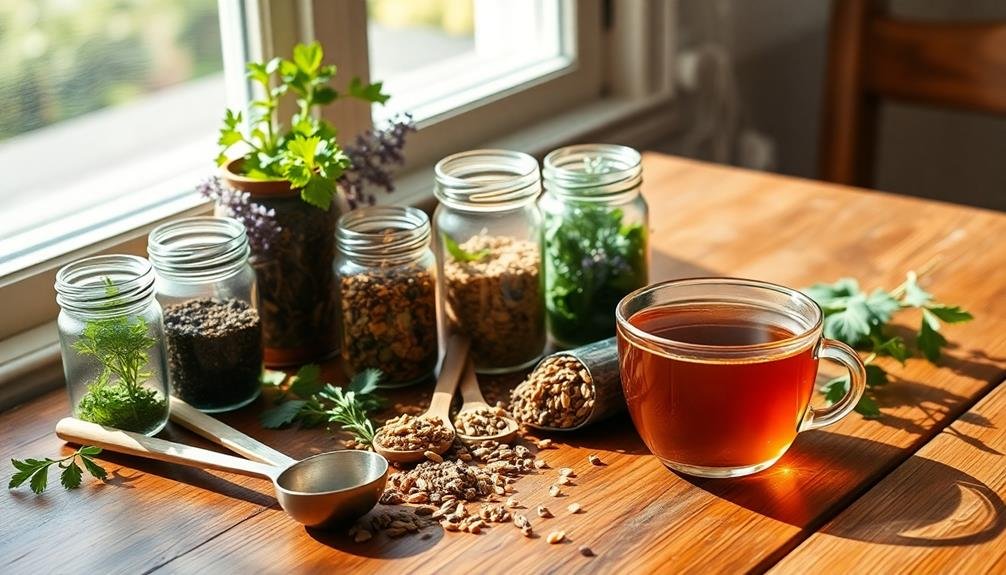
When choosing herbs for your gut-soothing tea, it's crucial to understand their unique properties and how they can benefit your digestion.
Consider your personal flavor preferences, as enjoying your tea can enhance the overall experience.
Balancing these factors will help you create a blend that's both effective and enjoyable.
Herbal Properties Explained
Choosing the right herbs for your gut-soothing tea blend can turn a simple drink into a powerful remedy. When selecting herbs, it's crucial to evaluate their specific properties and how they can benefit your digestive health.
Each herb offers unique benefits, so understanding these can help you create the perfect blend.
Here are some key factors to evaluate:
- Digestive Support: Look for herbs like peppermint or ginger, which can alleviate bloating and promote digestion.
- Anti-inflammatory Properties: Herbs such as chamomile and turmeric can help reduce inflammation in your gut, improving overall comfort.
- Calming Effects: If you're dealing with stress-related digestive issues, herbs like lemon balm or lavender can soothe your mind and body.
Personal Flavor Preferences
Exploring your personal flavor preferences is essential for crafting a gut-soothing herbal tea blend that you'll truly enjoy. Start by considering the herbs you already love. Are you a fan of minty freshness, or do you prefer the warmth of spices like cinnamon? This initial step helps you identify which flavors will enhance your blend.
Next, think about the balance you want to achieve. If you like sweet notes, herbs like chamomile or licorice root can provide that gentle sweetness. Alternatively, if you enjoy a bit of zest, consider adding ginger or lemongrass. Mixing complementary flavors can create a more enjoyable experience.
Don't forget about the aroma; the scent of your tea can greatly impact your enjoyment. Experiment with herbs like lavender or lemon verbena, which can elevate the fragrance of your blend.
Lastly, keep your gut health in mind. While you're experimenting, make sure the herbs you choose also offer soothing properties. By aligning your taste preferences with beneficial herbs, you'll create a delicious and effective herbal tea that supports your well-being.
Happy brewing!
Brewing Techniques for Optimal Flavor
To brew a gut-soothing herbal tea, start by choosing quality ingredients that enhance flavor and health benefits.
Next, pay attention to steeping time, as it can greatly affect the taste and potency of your brew.
Choosing Quality Ingredients
When crafting a gut-soothing herbal tea blend, selecting the right ingredients is essential for both flavor and health benefits. Quality matters because fresh, vibrant ingredients not only taste better but also pack more nutrients.
You want to guarantee that each herb you choose contributes to your tea's soothing properties while creating a delightful flavor profile.
To make the best choice, consider the following tips:
- Source Fresh Herbs: Opt for organic or locally sourced herbs, as they often retain higher potency and freshness.
- Check for Purity: Avoid blends with fillers or artificial ingredients, as they can dilute the health benefits and alter the flavor.
- Experiment with Ratios: Balance your herbs carefully. For example, a combination of ginger for digestion, peppermint for soothing, and chamomile for relaxation can create a harmonious blend.
Steeping Time Matters
While you might think that steeping herbal tea is a straightforward task, the duration of this process plays an essential role in achieving ideal flavor and health benefits. Steeping your tea for the right amount of time allows the essential oils and compounds to fully infuse into the water, enhancing both taste and efficacy.
Here's a quick reference table to help you gauge steeping times for different herbs:
| Herb | Recommended Steeping Time | Benefits |
|---|---|---|
| Chamomile | 5-7 minutes | Calming, aids sleep |
| Peppermint | 5-10 minutes | Digestive relief, energizing |
| Ginger | 10-15 minutes | Anti-inflammatory, digestion aid |
| Lemon Balm | 5-10 minutes | Anxiety relief, mood booster |
| Hibiscus | 10-15 minutes | Rich in antioxidants, heart health |
Paying attention to the steeping time can make a significant difference in your herbal tea experience. If you steep too long, you might end up with a bitter taste; steeping too short may leave you with a bland cup. So, keep an eye on the clock and enjoy your perfectly brewed gut-soothing herbal tea!
Temperature Control Tips
Getting the water temperature right is essential for brewing the perfect cup of herbal tea. Too hot, and you risk scalding delicate herbs; too cold, and you won't extract the full flavor.
Generally, herbal teas thrive best with water heated between 200°F and 212°F. Here's how to guarantee you hit that sweet spot:
- Use a thermometer: Invest in a kitchen thermometer for precise readings. This way, you can control the temperature exactly.
- Boil and cool: If you boil water, let it cool for about 30 seconds before pouring. This slight cooling can prevent bitterness.
- Pre-warm your teapot or cup: Rinse your brewing vessel with hot water first. This helps maintain the temperature while steeping.
Customizing Your Tea Blend
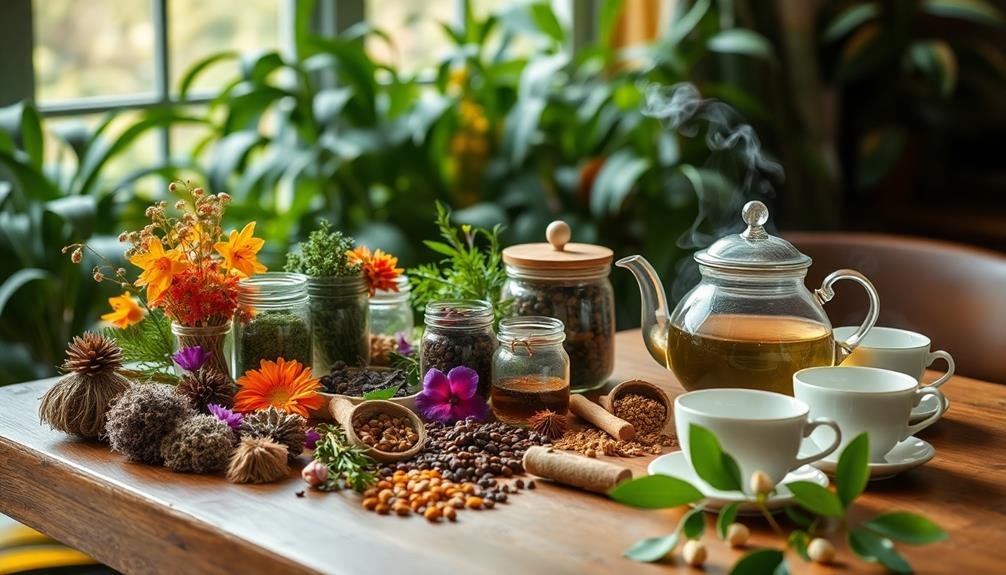
Creating your perfect gut-soothing herbal tea blend is an enjoyable process that allows you to tailor flavors and benefits to your unique taste and needs. Start by selecting your base herbs, like chamomile for its calming effects or peppermint for its digestive support.
Combine different herbs to enhance both flavor and health benefits; for instance, ginger can add a spicy kick while also aiding digestion.
Next, think about any additional flavors you'd like to incorporate. You can add citrus peels for a revitalizing twist or honey for natural sweetness.
Don't be afraid to experiment—try different ratios and combinations to find what truly resonates with you.
Consider your specific needs as well. If you're focusing on bloating, you might want to include fennel seeds. For stress relief, incorporate lemon balm or passionflower.
Keep a record of your successful blends so you can recreate your favorites.
Lastly, remember that the best tea blend is the one you enjoy most. Trust your palate, and don't hesitate to make adjustments as you go along.
Your personalized herbal tea won't only soothe your gut but also delight your senses.
Storage Tips for Freshness
To maintain the freshness of your gut-soothing herbal tea blend, proper storage is essential. By following a few simple tips, you can guarantee your tea retains its flavor and beneficial properties for longer.
Start by choosing the right container. Opt for an airtight, opaque jar to block out light and moisture, which can degrade the quality of your herbs.
Next, keep your tea in a cool, dry place. Avoid areas near the stove or windows where heat and humidity can affect the blend.
Finally, be mindful of the shelf life of your ingredients. Some herbs lose potency more quickly than others, so rotate your stock regularly.
Here are some key storage tips to remember:
- Use airtight containers to prevent exposure to air and moisture.
- Store in a dark, cool space away from heat sources and sunlight.
- Label your blends with the date you made them to track freshness.
Health Considerations and Precautions
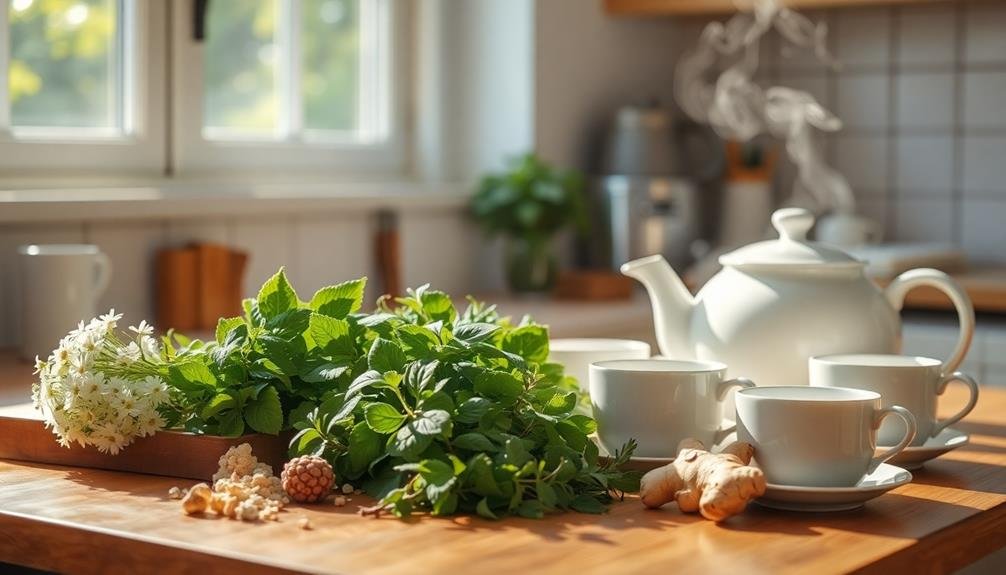
When enjoying your gut-soothing herbal tea blend, be mindful of any health considerations and precautions that may apply. While many herbs offer benefits, some can interact with medications or cause allergic reactions. Always consult with your healthcare provider, especially if you're pregnant, nursing, or have underlying health conditions.
Here's a quick reference table to help you keep track of common herbs and their considerations:
| Herb | Potential Effects | Precautions |
|---|---|---|
| Peppermint | May soothe digestive issues | Avoid if you have GERD |
| Ginger | Can reduce nausea | May interact with blood thinners |
| Chamomile | May help with relaxation | Watch for allergic reactions, especially if allergic to ragweed |
Always start with small amounts to see how your body reacts. If you notice any unusual symptoms, discontinue use and consult your doctor immediately. It's crucial to prioritize your health while enjoying the soothing properties of your herbal tea blend. Being informed can help you make the best choices for your well-being.
Enjoying Your Homemade Tea
As you settle down to enjoy your homemade tea, take a moment to appreciate the soothing aroma and vibrant colors of the herbs you've chosen.
This is your time to unwind, and each sip is a step towards nurturing your gut health. You've crafted this blend with care, so let its warmth envelop you.
To enhance your tea-drinking experience, consider these tips:
- Mindfulness: Focus on the flavors and sensations; let your mind relax as you savor each sip.
- Pairing: Enjoy your tea with a light snack that complements its taste, like a piece of honey-drizzled toast or a handful of nuts.
- Routine: Integrate this tea into your daily rituals. It can serve as a calming morning boost or a soothing evening wind-down.
Frequently Asked Questions
Can I Use Dried Herbs Instead of Fresh Ones?
Yes, you can definitely use dried herbs instead of fresh ones. Just remember that dried herbs are more concentrated, so you'll need less. Adjust the quantity to maintain the flavor and effectiveness in your tea.
How Long Does Homemade Herbal Tea Last?
Homemade herbal tea usually lasts about 3 to 5 days in the fridge. You can extend its freshness by storing it in an airtight container. Just remember to check for any off smells or flavors before drinking.
Is It Safe for Children to Drink Herbal Tea?
Yes, it's generally safe for children to drink herbal tea, but you should choose caffeine-free, mild varieties. Always consult your pediatrician before introducing new herbal teas to verify they're appropriate for your child's age and health.
Can I Mix Different Herbal Tea Blends?
Yes, you can mix different herbal tea blends! Experimenting with flavors and ingredients lets you create unique combinations. Just make sure the herbs you choose are safe and complementary for your taste and health. Enjoy your brewing!
What Are the Best Times to Drink Herbal Tea?
The best times to drink herbal tea are in the morning for an energizing start, during the afternoon for a calming break, and before bed to promote relaxation. You'll feel refreshed and rejuvenated throughout your day!
In Summary
Brewing your own gut-soothing herbal tea blend is a rewarding and flavorful way to support your digestion. With the right ingredients and techniques, you can create a personalized tea that meets your specific needs. Plus, you'll enjoy the freshness and aroma of your custom blend. Remember to store it properly and stay mindful of any health considerations. So go ahead, gather your herbs, and savor the comforting benefits of your homemade tea!


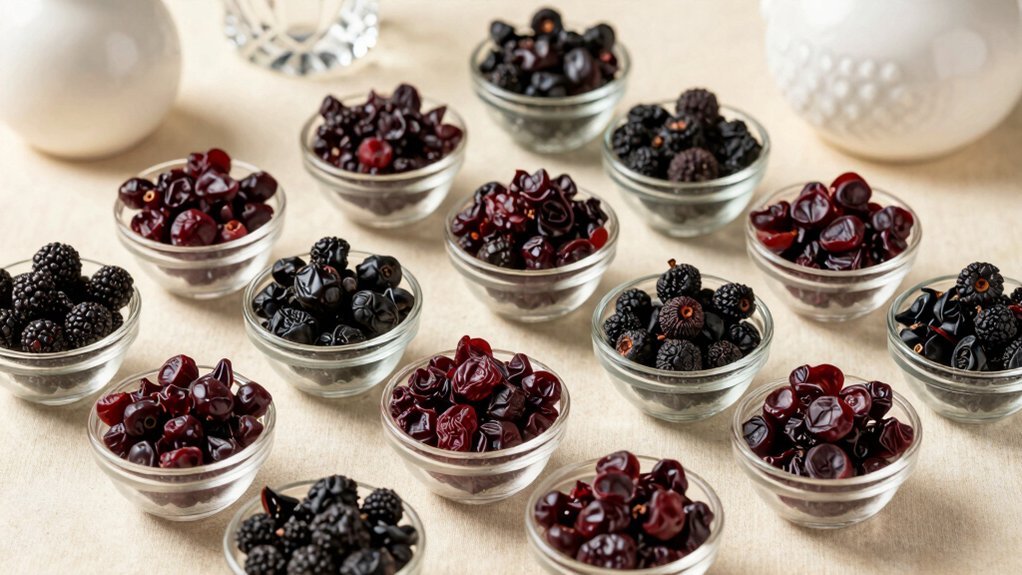
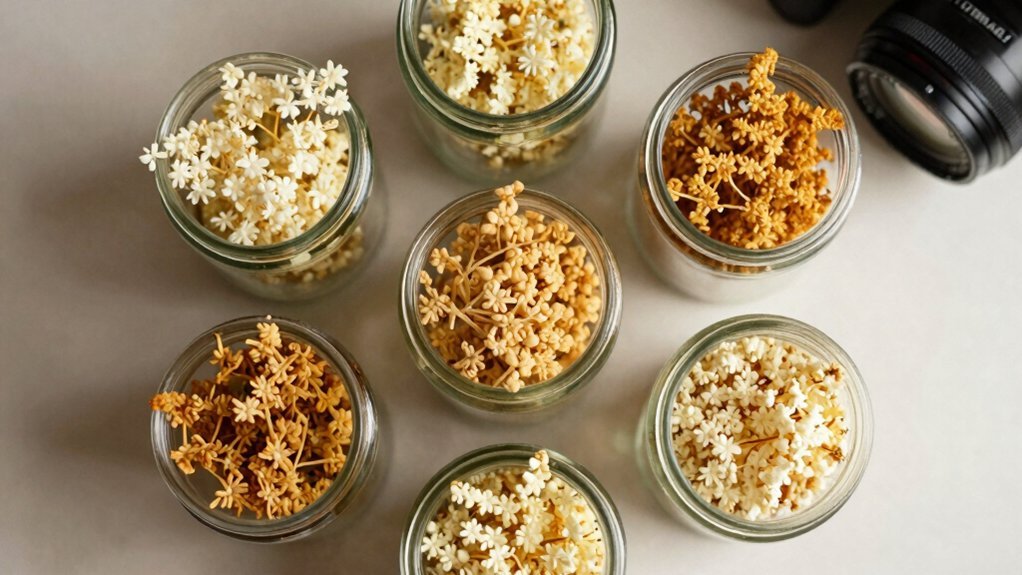
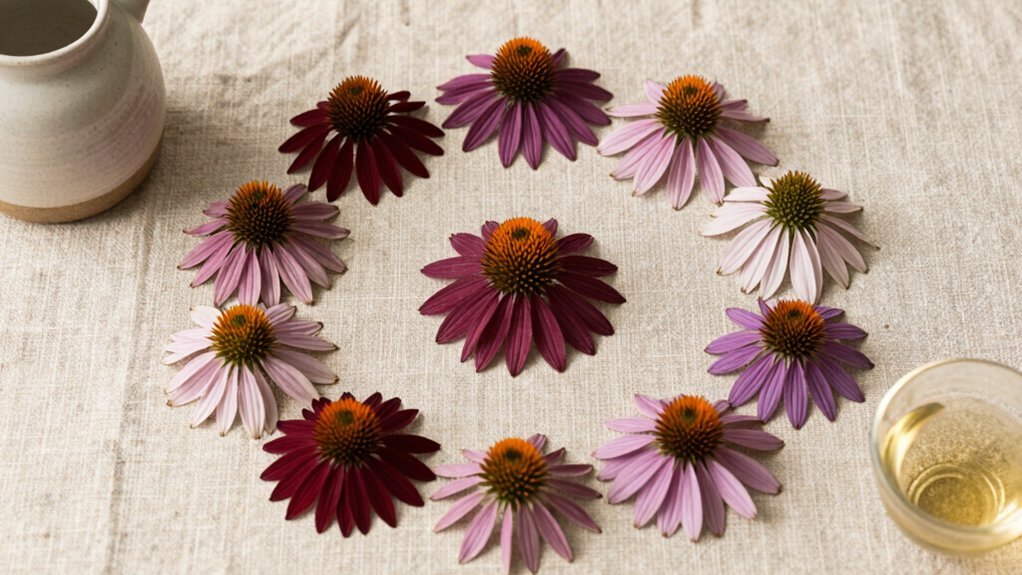
Leave a Reply